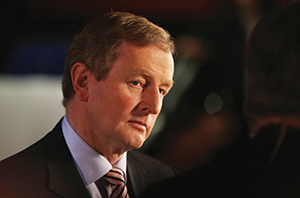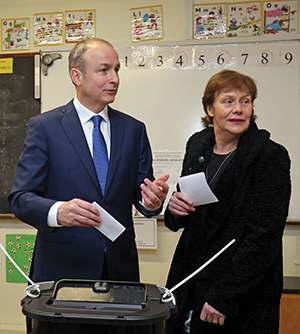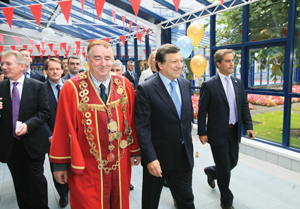Electoral strategies
 The election was Fine Gael’s to lose and they almost lost it. Despite returning to the Dáil with 50 seats the party will consider this a disappointing result at the end of a poor campaign.
The election was Fine Gael’s to lose and they almost lost it. Despite returning to the Dáil with 50 seats the party will consider this a disappointing result at the end of a poor campaign.
There was some good news for the party, tight vote management in Dun Laoghaire saw Fine Gael take two of the three seats available in the constituency. They also returned with two of the three seats on offer in Limerick County and two out of four in Dublin Bay South. If a general election was won solely in Dublin then Fine Gael could be proud of their performance as the party is now the most popular in Dublin.
However, to win a general election it is necessary to secure the support of the nation and this is where Fine Gael failed. Their slogan ‘keep the recovery going’ played well in the capital but around the country few have seen signs of a material recovery.
Plans to cut the universal social charge and increase public spending gave away the party’s claim to prudence and it appeared as if the party was fighting the election on the battlegrounds of 1997 and 2007. Internally, party figures have blamed the set of advisers at the top of the party dubbed ‘the Dublin 4’ for the poor national campaign and have spoken of the lack of a decisive leader like Phil Hogan in 2011 during the campaign.
The party’s original strategy in November focused too much on the economy and not social issues. While the rhetoric began to change in January, the electoral game plan did not and despite pleas from around the country the key message was not up for discussion.
Ultimately, Fine Gael’s director of elections Brian Hayes provided an astute assessment of the party’s campaign when he stated it focused too heavily on Dublin and failed to appreciate the party’s unpopularity across the country.

Given its battering at the polls in 2011 Fianna Fáil’s success in this election came as a surprise to many, including party members. However since 2011 Micheál Martin and his party have been laying the ground work for this success.
In the immediate run-up to the election, Fianna Fáil did not put a foot wrong. Its party slogan, ‘An Ireland for all’ was a key message that worked in portraying Fine Gael as a party of the wealthy.
The party’s biggest success story was Micheál Martin, the Leader’s debates suited his quick thinking and combative nature. The thrust of the campaign centred on his persona as his approval rating shot up during the campaign in contrast to that of his three main rivals though his finance spokesman Michael McGrath played a key role in dousing potential fires.
The party’s decision to stop apologising for the past and concentrate firmly on the here and now, as w
ell as its decision to allow a vote of conscience on the 8th amendment also played well across the country.
Since 2011, Micheál Martin has spent a lot of time pounding the pavement with candidates, this experience allowed the party to tap into the idea of two tier recovery which is permeating the public consciousness.
Ultimately, the party’s efforts on the ground bested the rest and with such electoral success there is no doubt such long hard strategic work has paid off.
Two years ago the party had 37 TDs, 4 MEPs and over 100 councillors now it has 7 TDs, no MEPS and 50 councillors. In the 2016 general election the party only amassed 6.6 per cent of first preference votes, what went wrong?
Many within the party feel there was no one single failure, everything went wrong. There was clear lack of political leadership and a decline in the party’s credibility. Having failed to follow through with many of their promises from 2011, the party’s strategy saw them make yet more promises.
The party presumed that Fine Gael would lead the next government and as such positioned itself as the party that could offer a balancing proposition. However, when support for Fine Gael started to fade, Labour had no ‘Plan B’ to fall back on. The tone taken in billboard advertisements was ridiculed and Joan Burton’s performance in the Leader’s debates did little to garner support for the party.
While the party hierarchy speak of the success of avoiding a similar fate to that suffered by the Liberal Democrats in last May’s Westminster elections, party members speak of their frustration at a campaign that placed the cohesion of the government as a higher priority than expressing the party’s identity.
This result will have hit Labour hard and it remains to be seen when they will next be in a position to play a constructive part in any future government.
Much was expected of Sinn Féin in this election and while the party did not quite have the spectacular election it hoped for it was still a successful campaign.
Prior to the election, party leader Gerry Adams, bruised by going public with expectations before, would only say that he hoped for more than 14 TDs. Having returned 23 TDs Sinn Féin are now the third largest party in the Dáil.
Adams’ performance in the Leadership debates, where he appeared to have a poor grasp of financial figures left much to be desired. However, at grassroots level his appeal remains strong. His performance in Louth helped secure Imelda Munster’s seat and his endorsement of many of the party’s new TDs played a large role in securing their election.
In Wicklow John Brady became the party’s first Dáil representative in the area for almost 100 years and David Cullinane secured a seat in Waterford while Carol Nolan was selected in the Offaly constituency.
The party ran into strong Independent candidates and the resurgent Fianna Fáil in some constituencies and was hampered by its ‘transfer-toxicity’.
The party worked hard to select transfer friendly candidates and strengthen the party brand but ultimately this was not enough in some constituencies.
There is a belief within the party that it is on a steady upwards trajectory and while the party dismiss questions on the leadership as little more than media fixation, many would be forgiven for wondering what a party led by a younger candidate with less ‘baggage’ could have achieved.

